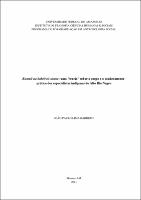| ???jsp.display-item.social.title??? |


|
Please use this identifier to cite or link to this item:
https://tede.ufam.edu.br/handle/tede/8289| ???metadata.dc.type???: | Tese |
| Title: | Kumuã na kahtiroti-ukuse: uma “teoria” sobre o corpo e o conhecimento-prático dos especialistas indígenas do Alto Rio Negro |
| ???metadata.dc.creator???: | Barreto, João Paulo Lima  |
| ???metadata.dc.contributor.advisor1???: | Santos, Gilton Mendes dos |
| ???metadata.dc.contributor.referee1???: | Olschewski, Luisa Elvira Belaunde |
| ???metadata.dc.contributor.referee2???: | Andrello, Geraldo Luciano |
| ???metadata.dc.contributor.referee3???: | Montardo, Deise Lucy Oliveira |
| ???metadata.dc.contributor.referee4???: | Dias Júnior, Carlos Machado |
| ???metadata.dc.description.resumo???: | Esta tese tem como objetivo central explorar a noção de corpo do ponto de vista dos especialistas indígenas do Alto Rio Negro, comumente conhecidos como “pajés”. As bases da investigação sobre o tema são os e os bahsese, o discurso e as experiências dos especialistas na intervenção sobre o corpo. No fundo, o corpo é o ponto de partida para pensar o pensamento e a filosofia rionegrina. O corpo constituído de elemento água, terra, luz/calor, animal, ar, floresta e qualidade de pessoa. A pessoa é sujeita de ataques de seres waimahsã, dos animais, dos alimentos, dos fenômenos naturais e das substâncias constitutivas que podem resultar no desequilíbrio do corpo. Prevenir contra os ataques, qualificar e equalizar os elementos que constituem o corpo via bahsese e uso de plantas medicinais é a garantia de qualidade da vida. Na filosofia rionegrina, o corpo humano é dinâmico, algo que está sempre em transformação. Essa transformação pode se dar pela qualificação via bahsese, pelo uso de sutiro e pelo devir pós-morte. De igual modo, os animais e vegetais são dinâmicos, se transformam e multiplicam. Dessa maneira, o corpo e as coisas do mundo não são algo fixo, mas estão em constante transformação. |
| Abstract: | This thesis has its main focus on the concept of the body as seen from the point of view of the experts in indigenous medicine in the Upper Rio Negro, popularly known as pajes. The basis of this research are the kihti ukũse and bahsese, fundamental conceptions for the manipulation and intervention on the body by the pajes. In a nutshell, the body is the starting point for thinking about the Rio Negro philosophies. The body, built by vegetal and mineral (air and water) substances, aerial phenomena (fire) and animal features. The self can be subject to attacks by entities known as waimahsã, by animals, by foods, by natural phenomena and by substances that are the results of an imbalance of the body energies. Prevent those attacks, rebalance the substances that constitutes the body by the caring via bahsese and using phytomedicine is the way to grant a good and balanced quality of life for the Upper Rio Negro people. In the Rio Negro philosophy the body is dynamic, and something that is always in a process of transformation. This transformation can happen via the process of bahsese, using sutiro and by the final transformation after death. Like humans, animals and vegetables too are dynamics, transform themselves and multiply themselves. As such, the body and everything in this world are not something fixed and stable, but on the contrary are in a constant process of transformation and metamorphosis. |
| Keywords: | Corpo humano - Doenças - Prevenção Corpo humano - Doenças - Tratamento |
| ???metadata.dc.subject.cnpq???: | CIÊNCIAS HUMANAS |
| ???metadata.dc.subject.user???: | Mahã kahtiro (pessoa, gente) Hpu (corpo) Doatise (doenças) Duhtitise (ataques) |
| Language: | por |
| ???metadata.dc.publisher.country???: | Brasil |
| Publisher: | Universidade Federal do Amazonas |
| ???metadata.dc.publisher.initials???: | UFAM |
| ???metadata.dc.publisher.department???: | Instituto de Filosofia, Ciências Humanas e Sociais |
| ???metadata.dc.publisher.program???: | Programa de Pós-graduação em Antropologia Social |
| Citation: | BARRETO, João Paulo Lima. Kumuã na kahtiroti-ukuse: uma “teoria” sobre o corpo e o conhecimento-prático dos especialistas indígenas do Alto Rio Negro. 2021. 190 f. Tese (Doutorado em Antropologia Social) - Universidade Federal do Amazonas, Manaus (AM), 2021. |
| ???metadata.dc.rights???: | Acesso Aberto |
| ???metadata.dc.rights.uri???: | http://creativecommons.org/licenses/by-nc-nd/4.0/ |
| URI: | https://tede.ufam.edu.br/handle/tede/8289 |
| Issue Date: | 4-Feb-2021 |
| Appears in Collections: | Doutorado em Antropologia Social |
Files in This Item:
| File | Description | Size | Format | |
|---|---|---|---|---|
| Tese_João Paulo_PPGAS.pdf | 1.38 MB | Adobe PDF |  Download/Open Preview |
This item is licensed under a Creative Commons License





